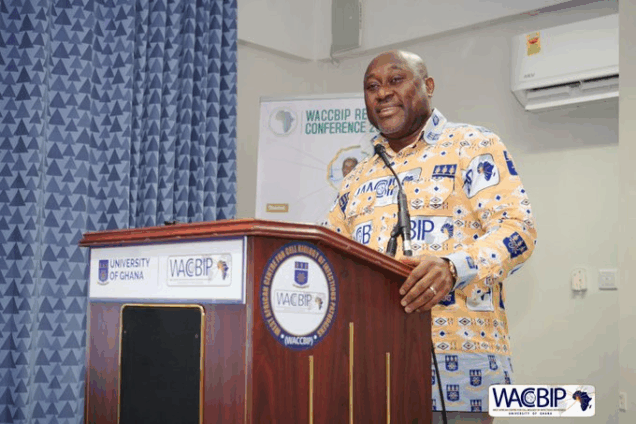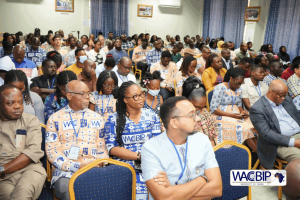Founding Director of the West African Centre for Cell Biology of Infectious Pathogens (WACCBIP) at the University of Ghana, Professor Gordon Awandare, has reiterated that delays by the government are impeding critical work at the African Centres of Excellence established by the World Bank to provide timely research aimed at addressing policy gaps across the continent.
He made the remarks on the sidelines of the 2025 WACCBIP Research Conference, taking place on the campus of the University of Ghana from July 23 to July 25, 2025. The conference brings together seasoned researchers, policymakers, donor partners, young academics, and captains of industry to brainstorm on the changing dynamics of scientific research and its implications for the continent and the world at large.
Speaking at the event, Professor Awandare intimated that the delays in releasing research bursaries to African Centres of Excellence—such as WACCBIP and its sister institutions, the West African Centre for Crop Improvement (WACCI) and the West African Genetic Medicine Centre (WAGMC)—are frustrating the day-to-day operations of these crucial entities. These centres are committed to undertaking vital research across multiple fields to help drive innovative change in society.
“The government must put its mouth where the money is, to enable these entities to execute their mandates without undue delays. This is part of its commitment under the agreement with the World Bank,” he said.
“The World Bank, through the Government of Ghana, has invested heavily in building world-class centres like WACCBIP, WAGMC, and WACCI to entrench the role of research in driving innovation. The activities of these centres are heavily dependent on a regular flow of funds, and urgent measures must be taken by the state to release the earmarked resources to enhance operational efficiency and meet the objectives outlined in the partnership agreement.”
“Anything short of this,” he added, “would amount to a betrayal of the trust and commitment demonstrated by all parties during the negotiations that gave rise to these excellent, results-oriented facilities.”
Professor Awandare emphasised that the Centres of Excellence were established to serve as additional buffers for African governments to build, design, and produce innovative solutions to long-standing challenges—such as sanitation, engineering, disease detection, microbiology, and crop improvement—while also functioning as continental hubs for professional training of students and faculty.
“The development of these world-class facilities through counterpart funding from the World Bank was intended to help governments address infrastructural and skills-training gaps in sensitive areas such as water and sanitation, crop improvement, medical diagnostics, and disease prevention. They also serve as regional hubs, providing top-notch education and training to professionals across the continent to help mitigate the consequences of policy failures in these sectors.”
He concluded by calling on African governments to show stronger ownership of the vision and mission of these centres by providing timely funding that will enable them to expand their operations and deliver optimal policy impact both on the continent and globally.
He further urged African countries to craft more steadfast policies that place innovation and research at the centre of national discourse, rather than continually relying on external solutions that may come with skewed interests.
–
Story by Sika Togoh|univers.ug.edu.gh






